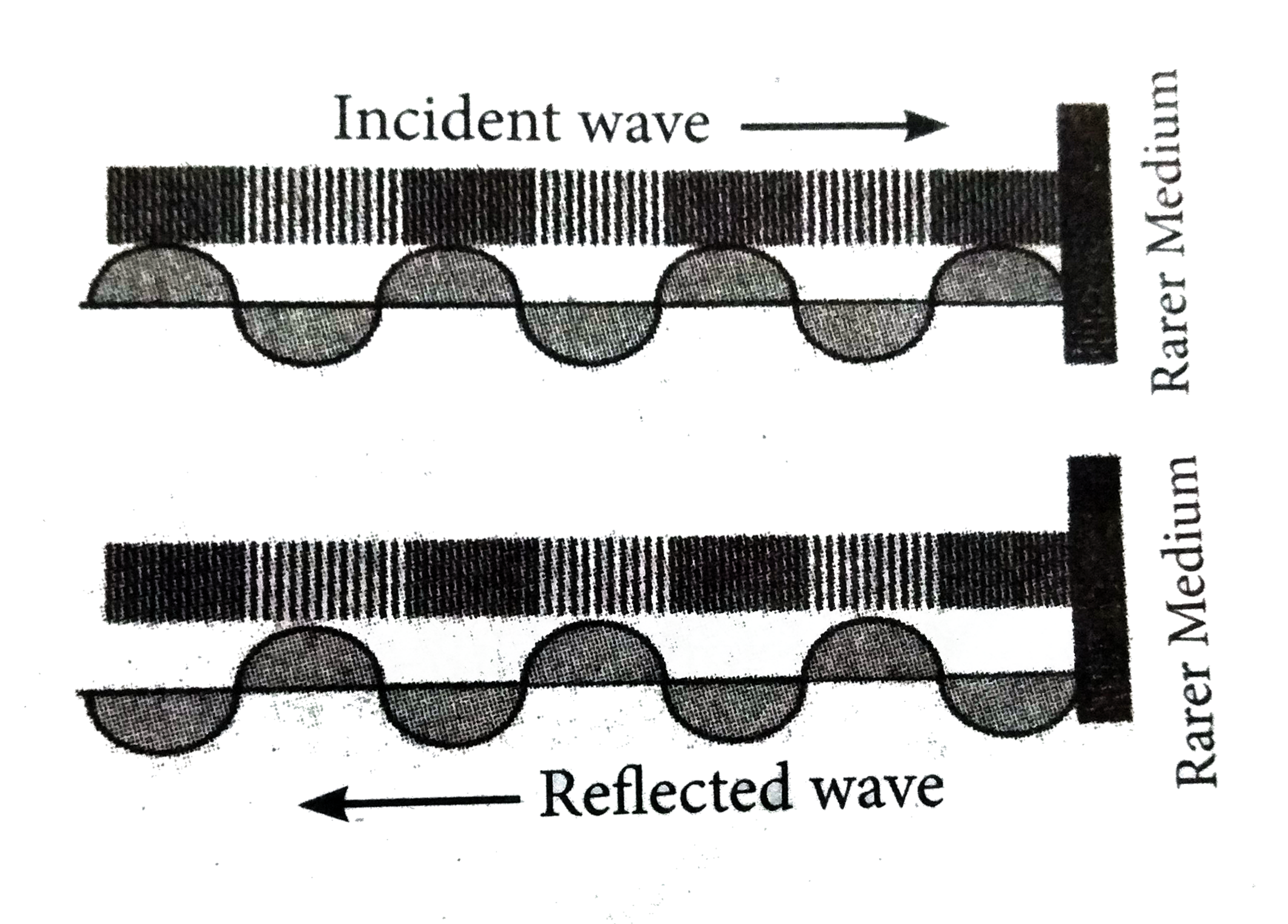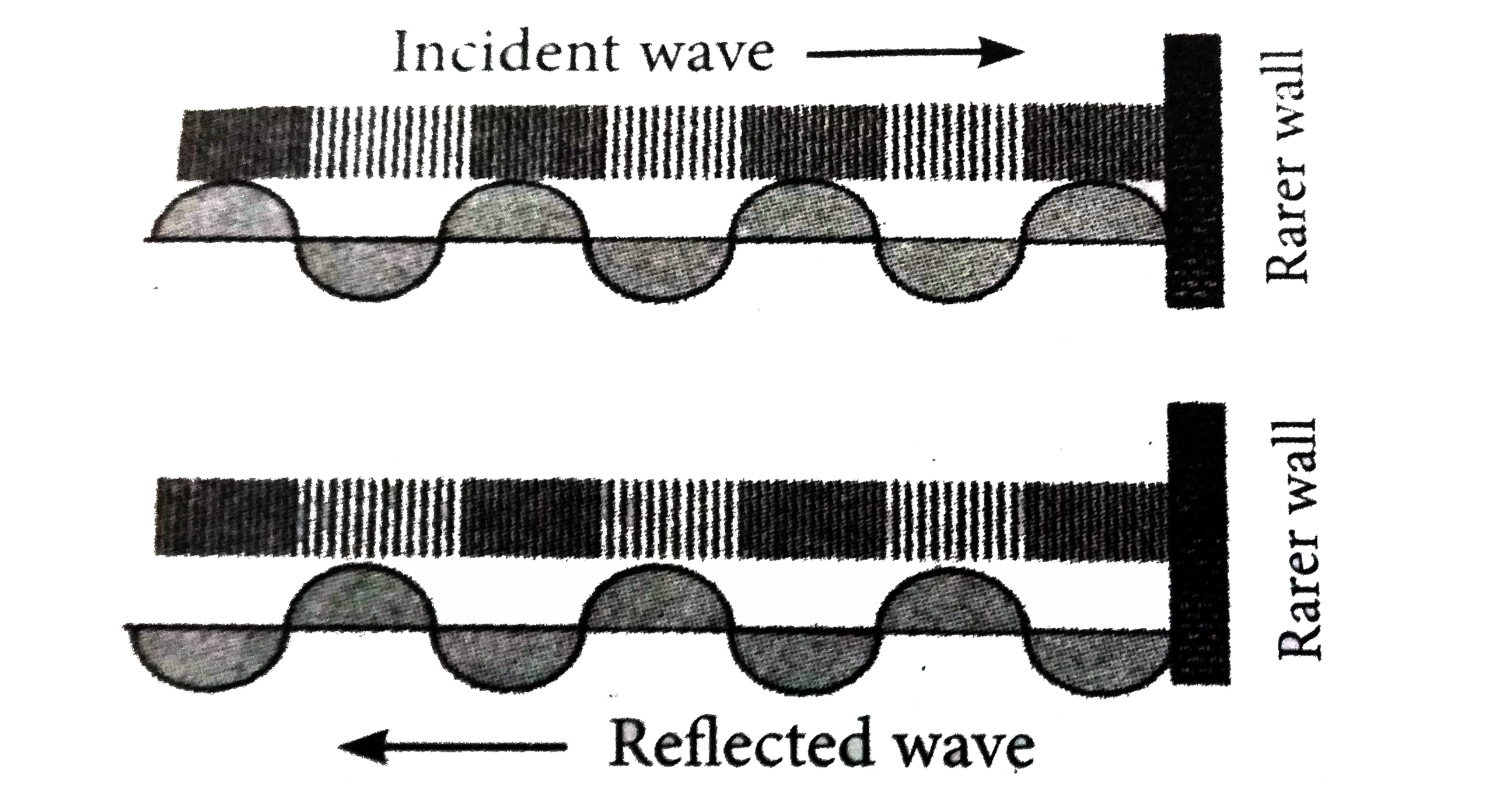What is mean by rellection of sound? Explain.
(a) Reflection at the boundary of a rarer medium
(b) Reflection at the boundary of a denser medium
(c) Reflection at sound in curved surfacesSolution in Tamil
When sound waves travel in a given medium and strike the surface of another medium , it can be bounced back into the first medium is called as reflection.
a)Reflection in rarer medium:
(i) Consider a wave travelling in a solid medium striking on the interface between the solid and the air.
(ii) The compression exerts a force f on the surface of the rarer medium.

(iii) As a rarer medium has smaller resistance for any deformation, the surface of separation is pushed backwards (Figure).
(iv) As the particles of the rarer medmm are free to move, a rarefaction is produced at the interface.
(v) Thus, a compression is reflected as a rarefaction and a rarefaction travels from right to left.
b) Reflection in denser medium :
(i) A longitudinal wave travels in a medium in the form of compressions and rare factions.
(ii) Suppose a compression travelling in air from left to right reaches a rigid wall.
(iii) The compression exerts a force F on the rigid wall.
(iv) The wall exerts an equal and opposite reaction R = -F on the air molecules. This results in a compression near the rigid wall.
(v) Thus, a compression travelling towards the rigid wall is reflected back as a compression. That is, the direction of compression is reversed.

c) Reflection in curved surfaces :
(i) When sound waves are reflected from curved surfaces, the intensity of reflected waves is changed.
(ii) Sound reflected from a convex surface:
Reflected waves get diverged.
Intensity is decreased.
(iii) Sound reflected from concave surface:
Reflected waves get converged.
Intensity is concentrated at points.
(iv) Parabolic surfaces -required to focus the sound at a particular point. Hence, many halls are designed with parabolic reflecting surfaces.
(v) Elliptical surfaces -sound from one focus will always be reflected to the other focus.
(vi) No matter where it strikes the wall.
Topper's Solved these Questions
- ACOUSTICSBOOK - SURA PUBLICATIONCHAPTER - ACOUSTICSEXERCISE - TEXTBOOK EVATUATION (HOT QUESTIONS)
2 Videos
- ACOUSTICSBOOK - SURA PUBLICATIONCHAPTER - ACOUSTICSEXERCISE - GOVERNMENT EXAM QUESTIONS & ANSWERS
1 Videos
- ACOUSTICSBOOK - SURA PUBLICATIONCHAPTER - ACOUSTICSEXERCISE - TEXTBOOK EVATUATION (PROBLEM CORNER)
7 Videos
- ELECTRICITYBOOK - SURA PUBLICATIONCHAPTER - ELECTRICITYEXERCISE - ADDITIONAL QUESTIONS & ANSWRES (Value Based Question)
1 Videos
Similar Questions
Suppose that a sound wave and a light wave have the same frequency, then which one has a longer wavelength?
View SolutionA source of sound is moving with a velocity of 50ms−1 towards a stationary listener. The listener measures the frequency of the source as 1000Hz. What will be the apparent frequency of the source when it is moving away from the listener after crossing him? (velocity of sound in the medium is 330ms−1).
View SolutionA sound wave has a frequency of 200 Hz and a speed of 400ms−1in a medium. Find the wavelength of the sound wave. ?
Give : Frequency of a wave, n = 200 Hz
Speed of sound, V = 400ms−1
To find : Wavelength, λ=?
View SolutionKalaivani was watching at a metal pipe, one end of which is connected to a tank at the top of her building and the other end to the tap, which is near the ground level. She was admiring how the water flows from top to the bottom through the pipe. She went and asked her mother, who was an engineer.
(i) Also Kalaivani asked her mother that can she able to compare this with any other scientific concepts ?
(ii) How would her mother have compared the resistance in a water pipe as well as in a conductor.
(iii) Give the expression for resistors connected in series and parallel.
View SolutionA sound waves passes from a medium A to a medium B. The velocity of sound in B is greater than in A. Assume that there is no absorption or reflection at the boundary . As the wave moves across the boundary :
View SolutionWhat happens to a particle velocity when a sound wave is reflected from a rarer medium and a denser medium ?
View SolutionWhen sound waves are reflected from a denser medium
View SolutionExplain the reflection of transverse and longitudinal waves from a denser and a rarer medium.
View SolutionIf sound waves reflected from the denser medium, then there is
View SolutionWhen sound is reflected from a denser medium
View SolutionWhen sound waves are reflected from a denser medium
View SolutionWhen sound is reflected from a denser medium,
View SolutionA : If a wave moving in a rarer medium , gets reflected at the boundary of a denser medium , then it encounter a sudden change in phaso or pi . R : If a wave propagating in a denser medium , gets reflected from rarer medium , then there will be no abrupt phase change .
View SolutionWhat is mean by rellection of sound? Explain.
(a) Reflection at the boundary of a rarer medium
(b) Reflection at the boundary of a denser medium
(c) Reflection at sound in curved surfaces
View SolutionA sound wave passes from a medium A to a medium B. The velocity of sound B is greater than that in A. Assume that there is no absorption or reflection at the boundary. As the wave moves across the boundary
View SolutionWhen sound is reflected from a denser medium,
View Solution
